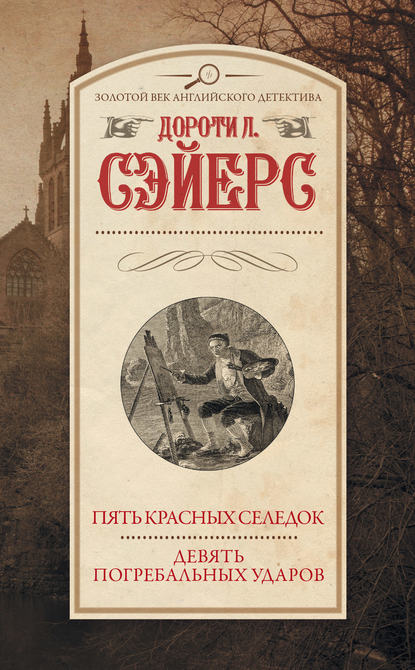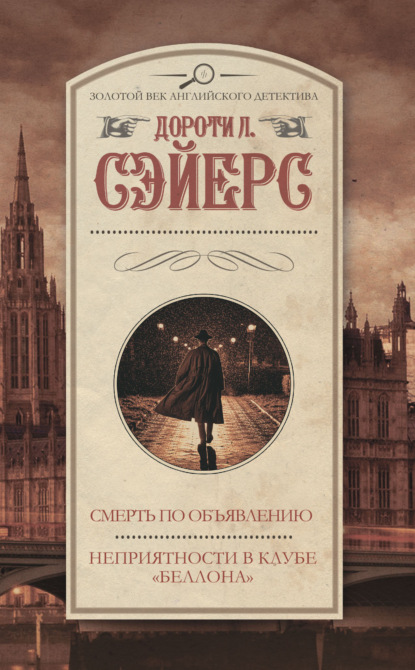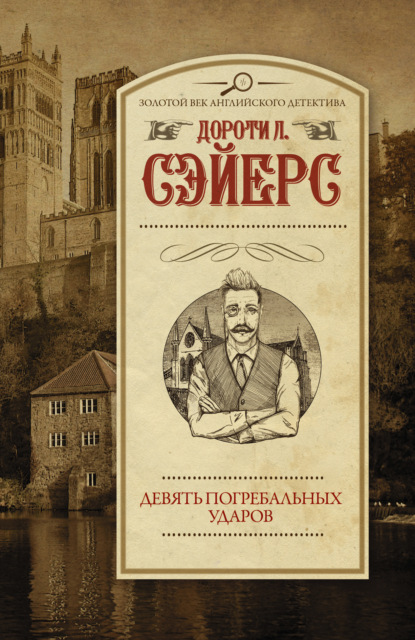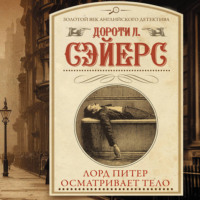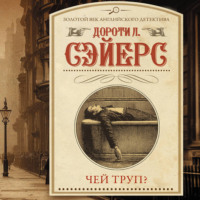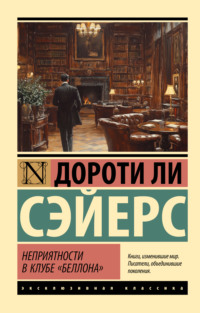
Полная версия
Clouds of Witness
He sat down on the wall, and, drawing out his notebook, began to jot down a description of the man from the data already known.
"Things begin to look a bit more comfortable for old Jerry," said Lord Peter. He leaned on the wall and began whistling softly, but with great accuracy, that elaborate passage of Bach which begins "Let Zion's children."
* * *"I wonder," said the Hon. Freddy Arbuthnot, "what damn silly fool invented Sunday afternoon." He shovelled coals on to the library fire with a vicious [missing] waking Colonel Marchbanks, who said, "Eh?"
"Don't you grumble, Freddy," said Lord Peter, who had been occupied for some time in opening and shutting all the drawers of the writing-table in a thoroughly irritating manner, and idly snapping to and fro the catch of the French window. "Think how dull old Jerry must feel. S'pose I'd better write him a line."
He returned to the table and took a sheet of paper.
"Do people use this room much to write letters in, do you know?"
"No idea," said the Hon. Freddy. "Never write 'em myself. Where's the point of writin' when you can wire? Encourages people to write back, that's all. I think Denver writes here when he writes anywhere, and I saw the Colonel wrestlin' with pen and ink a day or two ago, didn't you, Colonel?" (The Colonel grunted, answering to his name like a dog that wags its tail in its sleep.) "What's the matter? Ain't there any ink?"
"I only wondered," replied Peter placidly. He slipped a paper-knife under the top sheet of the blotting-pad and held it up to the light. "Quite right, old man. Give you full marks for observation. Here's Jerry's signature, and the Colonel's, and a big, sprawly hand, which I should judge to be feminine." He looked at the sheet again, shook his head, folded it up, and placed it in his pocket-book. "Doesn't seem to be anything there," he commented, "but you never know. 'Five something of fine something'-grouse, probably. 'oe-is fou'-is found, I suppose. Well, it can't do any harm to keep it." He spread out his paper and began:
" Dear Jerry, – Here I am, the family sleuth on the trail, and it's damned exciting-"
The Colonel snored.
Sunday afternoon. Parker had gone with the car to King's Fenton, with orders to look in at Riddlesdale on the way and inquire for a green-eyed cat, also for a young man, with a side-car. The Duchess was lying down, Mrs. Pettigrew-Robinson had taken her husband for a brisk walk. Upstairs, somewhere, Mrs. Marchbanks enjoyed a perfect communion of thought with her husband.
Lord Peter's pen gritted gently over the paper, stopped, moved on again, stopped altogether. He leaned his long chin on his hands and stared out of the window, against which there came sudden little swishes of rain, and from time to time a soft, dead leaf. The Colonel snored; the fire tinkled; the Hon. Freddy began to hum and tap his fingers on the arms of his chair. The clock moved slothfully on to five o'clock, which brought tea-time and the Duchess.
"How's Mary?" asked Lord Peter, coming suddenly into the firelight.
"I'm really worried about her," said the Duchess. "She is giving way to her nerves in the strangest manner. It is so unlike her. She will hardly let anybody come near her. I have sent for Dr. Thorpe again."
"Don't you think she'd be better if she got up an' came downstairs a bit?" suggested Wimsey. "Gets broodin' about things all by herself, I shouldn't wonder. Wants a bit of Freddy's intellectual conversation to cheer her up."
"You forget; poor girl," said the Duchess, "she was engaged to Captain Cathcart. Everybody isn't as callous as you are."
"Any more letters, your grace?" asked the footman, appearing with the post-bag.
"Oh, are you going down now?" said Wimsey. "Yes here you are-and there's one other, if you don't mind waitin' a minute while I write it. Wish I could write at the rate people do on the cinema," he added, scribbling rapidly as he spoke. " 'Dear Lilian, – Your father has killed Mr. William Snooks, and unless you send me £1,000 by bearer, I shall disclose all to your husband.-Sincerely, Earl of Digglesbrake.' That's the style; and all done in one scrape of the pen. Here you are, Fleming."
The letter was addressed to her grace the Dowager Duchess of Denver.
From the Morning Post of Monday, November-, 19-:
" Abandoned Motorcycle
" A singular discovery was made yesterday by a cattle-drover. He is accustomed to water his animals in a certain pond lying a little off the road about twelve miles south of Ripley. On this occasion he saw that one of them appeared to be in difficulties. On going to the rescue, he found the animal entangled in a motor-cycle, which had been driven into the pond and abandoned. With the assistance of a couple of workmen he extricated the machine. It is a Douglas, with dark-grey side-car. The number-plates and licence-holder have been carefully removed. The pond is a deep one, and the outfit was entirely submerged. It seems probable, however, that it could not have been there for more than a week, since the pond is much used on Sundays and Mondays for the watering of cattle. The police are making search for the owner. The front tyre of the bicycle is a new Dunlop, and the side-car tyre has been repaired with gaiter. The machine is a 1914 model, much worn."
"That seems to strike a chord," said Lord Peter musingly. He consulted a time-table for the time of the next train to Ripley, and ordered the car.
"And send Bunter to me," he added.
That gentleman arrived just as his master was struggling into an overcoat.
"What was that thing in last Thursday's paper about a number-plate, Bunter?" inquired his lordship.
Mr. Bunter produced, apparently by legerdemain, a cutting from an evening paper:
" Number-plate Mystery
" The Rev. Nathaniel Foulis, of St. Simon's, North Fellcote, was stopped at six o'clock this morning for riding a motor-cycle without number-plates. The reverend gentleman seemed thunderstruck when his attention was called to the matter. He explained that he had been sent for in great haste at 4 A.M. to administer the Sacrament to a dying parishioner six miles away. He hastened out on his motorcycle, which he confidingly left by the roadside while executing his sacred duties. Mr. Foulis left the house at 5.30 without noticing that anything was wrong. Mr. Foulis is well known in North Fellcote and the surrounding country, and there seems little doubt that he has been the victim of a senseless practical joke. North Fellcote is a small village a couple of miles north of Ripley."
"I'm going to Ripley, Bunter," said Lord Peter.
"Yes, my lord. Does your lordship require me?"
"No," said Lord Peter, "but-who has been lady's maiding my sister, Bunter?"
"Ellen, my lord-the housemaid."
"Then I wish you'd exercise your powers of conversation on Ellen."
"Very good, my lord."
"Does she mend my sister's clothes, and brush her skirts, and all that?"
"I believe so, my lord."
"Nothing she may think is of any importance, you know, Bunter."
"I wouldn't suggest such a thing to a woman, my lord. It goes to their heads, if I may say so."
"When did Mr. Parker leave for town?"
"At six o'clock this morning, my lord."
* * *Circumstances favoured Mr. Bunter's inquiries. He bumped into Ellen as she was descending the back stairs with an armful of clothing. A pair of leather gauntlets was jerked from the top of the pile, and, picking them up, he apologetically followed the young woman into the servants' hall.
"There," said Ellen, flinging her burden on the table, "and the work I've had to get them, I'm sure. Tantrums, that's what I call it, pretending you've got such a headache you can't let a person into the room to take your things down to brush, and, as soon as they're out of the way, 'opping out of bed and trapesing all over the place. 'Tisn't what I call a headache, would you, now? But there! I daresay you don't get them like I do. Regular fit to split, my head is sometimes-couldn't keep on my feet, not if the house was burning down. I just have to lay down and keep laying-something cruel it is. And gives a person such wrinkles in one's forehead."
"I'm sure I don't see any wrinkles," said Mr. Bunter, "but perhaps I haven't looked hard enough." An interlude followed, during which Mr. Bunter looked hard enough and close enough to distinguish wrinkles. "No," said he, "wrinkles? I don't believe I'd see any if I was to take his lordship's big microscope he keeps up in town."
"Lor' now, Mr. Bunter," said Ellen, fetching a sponge and a bottle of benzine from the cupboard, "what would his lordship be using a thing like that for, now?"
"Why, in our hobby, you see, Miss Ellen, which is criminal investigation, we might want to see something magnified extra big-as it might be handwriting in a forgery case, to see if anything's been altered or rubbed out, or if different kinds of ink have been used. Or we might want to look at the roots of a lock of hair, to see if it's been torn out or fallen out. Or take bloodstains, now; we'd want to know if it was animal's blood or human blood, or maybe only a glass of port."
"Now is it really true, Mr. Bunter," said Ellen, laying a tweed skirt out upon the table and unstoppering the benzine, "that you and Lord Peter can find out all that?"
"Of course, we aren't analytical chemists," Mr. Bunter replied, "but his lordship's dabbled in a lot of things-enough to know when anything looks suspicious, and if we've any doubts we send to a very famous scientific gentleman." (He gallantly intercepted Ellen's hand as it approached the skirt with a benzene-soaked sponge.) "For instance, now, here's a stain on the hem of this skirt, just at the bottom of the side-seam. Now, supposing it was a case of murder, we'll say, and the person that had worn this skirt was suspected, I should examine that stain." (Here Mr. Bunter whipped a lens out of his pocket.) "Then I might try it at one edge with a wet handkerchief." (And suited the action to the word.) "And I should find you see, that it came off red. Then I should turn the skirt inside-out, I should see that the stain went right through, and I should take my scissors" (Mr. Bunter produced a small, sharp pair) "and snip off a tiny bit of the inside edge of the seam, like this" (he did so) "and pop it into a little pill-box, so" (the pill-box appeared magically from an inner pocket), "and seal it up both sides with a wafer, and write on the top 'Lady Mary Wimsey's skirt,' and the date. Then I should sent it straight off to the analytical gentleman in London, and he'd look through his microscope, and tell me right off that it was rabbit's blood, maybe, and how many days it had been there, and that would be the end of that," finished Mr. Bunter triumphantly, replacing his nail-scissors and thoughtlessly pocketing the pill-box with its contents.
"Well, he'd be wrong, then," said Ellen, with an engaging toss of the head, "because it's bird's blood, and not rabbit's at all, because her ladyship told me so; and wouldn't it be quicker just to go and ask the person than get fiddling round with your silly old microscope and things?"
"Well, I only mentioned rabbits for an example," said Mr. Bunter. "Funny she should have got a stain down there. Must have regularly knelt in it."
"Yes. Bled a lot, hasn't it, poor thing? Somebody must 'a' been shootin' careless-like. 'Twasn't his grace, or yet the Captain, poor man. Perhaps it was Mr. Arbuthnot. He shoots a bit wild sometimes. It's a nasty mess, anyway, and it's so hard to clean off, being it so long. I'm sure I wasn't thinking about cleaning anything the day the poor Captain was killed; and then the Coroner's inquest-'orrid, it was-and his grace being took off like that! Well, there, it upset me. I suppose I'm a bit sensitive. Anyhow, we was all at sixes and sevens for a day or two, and then her ladyship shuts herself up in her room and won't let me go near the wardrobe. 'Ow!' she says, 'do leave that wardrobe door alone. Don't you know it squeaks, and my head's so bad and my nerves so bad I can't stand it,' she says. 'I was only going to brush your skirts, my lady,' I says. 'Bother my skirts,' says her ladyship, 'and do go away, Ellen. I shall scream if I see you fidgeting about there. You get on my nerves,' she says. Well, I didn't see why I should go on, not after being spoken to like that. It's very nice to be a ladyship, and all your tempers coddled and called nervous prostration. I know I was dreadfully cut up about poor Bert, my young man what was killed in the war-nearly cried my eyes out, I did; but, law! Mr. Bunter, I'd be ashamed to go on so. Besides, between you and I and the gate-post, Lady Mary wasn't that fond of the Captain. Never appreciated him, that's what I said to cook at the time, and she agreed with me. He had a way with him, the Captain had. Always quite the gentleman, of course, and never said anything as wasn't his place-I don't mean that-but I mean as it was a pleasure to do anythink for him. Such a handsome man as he was, too, Mr. Bunter."
"Ah!" said Mr. Bunter. "So on the whole her ladyship was a bit more upset than you expected her to be?"
"Well, to tell you the truth, Mr. Bunter, I think it's just temper. She wanted to get married and away from home. Drat this stain! It's regular dried in. She and his grace could never get on, and when she was away in London during the war she had a rare old time, nursing officers, and going about with all kinds of queer people his grace didn't approve of. Then she had a sort of a love-affair with some quite low-down sort of fellow, so cook says; I think he was one of them dirty Russians as wants to blow us all to smithereens-as if there hadn't been enough people blown up in the war already! Anyhow, his grace made a dreadful fuss, and stopped supplies, and sent for her ladyship home, and ever since then she's been just mad to be off with somebody. Full of notions, she is. Makes me tired, I can tell you. Now, I'm sorry for his grace. I can see what he thinks. Poor gentleman! And then to be taken up for murder and put in gaol, just like one of them nasty tramps. Fancy!"
Ellen, having exhausted her breath and finished cleaning off the bloodstains, paused and straightened her back.
"Hard work it is," she said, "rubbing; I quite ache."
"If you would allow me to help you," said Mr. Bunter, appropriating the hot water, the benzine bottle, and the sponge.
He turned up another breadth of the skirt.
"Have you got a brush handy," he asked, "to take this mud off?"
"You're as blind as a bat, Mr. Bunter," said Ellen, giggling. "Can't you see it just in front of you?"
"Ah, yes," said the valet. "But that's not as hard a one as I'd like. Just you run and get me a real hard one, there's a dear good girl, and I'll fix this for you."
"Cheek!" said Ellen. "But," she added, relenting before the admiring gleam in Mr. Bunter's eye, "I'll get the clothes-brush out of the hall for you. That's as hard as a brick-bat, that is."
No sooner was she out of the room than Mr. Bunter produced a pocket-knife and two more pillboxes. In the inkling of an eye he had scraped the surface of the skirt in two places and written two fresh labels "Gravel from Lady Mary's skirt, about 6 in. from hem." "Silver sand from hem of Lady Mary's skirt."
He added the date, and had hardly pocketed the boxes when Ellen returned with the clothes-brush.
The cleaning process continued for some time, to the accompaniment of desultory conversation. A third stain on the skirt caused Mr. Bunter to stare critically.
"Hullo!" he said. "Her ladyship's been trying her hand at cleaning this herself."
"What?" cried Ellen. She peered closely at the mark, which at one edge was smeared and whitened, and had a slightly greasy appearance.
"Well, I never," she exclaimed, "so she has! Whatever's that for, I wonder? And her pretending to be so ill she couldn't raise her head off the pillow. She's a sly one, she is."
"Couldn't it have been done before?" suggested Mr. Bunter.
"Well, she might have been at it between the day the Captain was killed and the inquest," agreed Ellen, "though you wouldn't think that was a time to choose to begin learning domestic work. She ain't much hand at it, anyhow, for all her nursing. I never believed that came to anything."
"She's used soap," said Mr. Bunter, benzening away resolutely. "Can she boil water in her bedroom?"
"Now, whatever should she do that for, Mr. Bunter?" exclaimed Ellen, amazed. "You don't think she keeps a kettle? I bring up her morning tea. Ladyships don't want to boil water."
Конец ознакомительного фрагмента.
Текст предоставлен ООО «Литрес».
Прочитайте эту книгу целиком, купив полную легальную версию на Литрес.
Безопасно оплатить книгу можно банковской картой Visa, MasterCard, Maestro, со счета мобильного телефона, с платежного терминала, в салоне МТС или Связной, через PayPal, WebMoney, Яндекс.Деньги, QIWI Кошелек, бонусными картами или другим удобным Вам способом.


